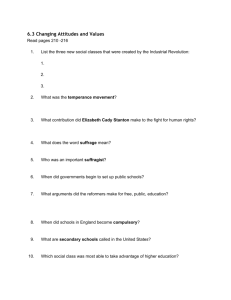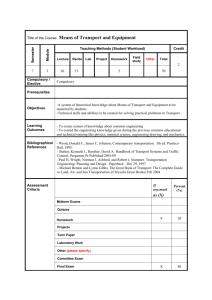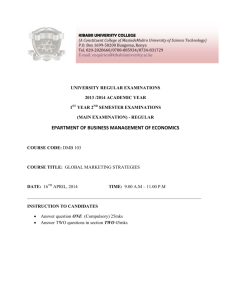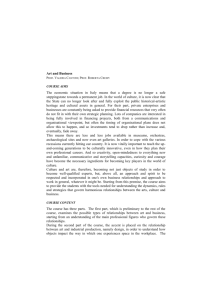Общий и стратегический менеджмент
advertisement
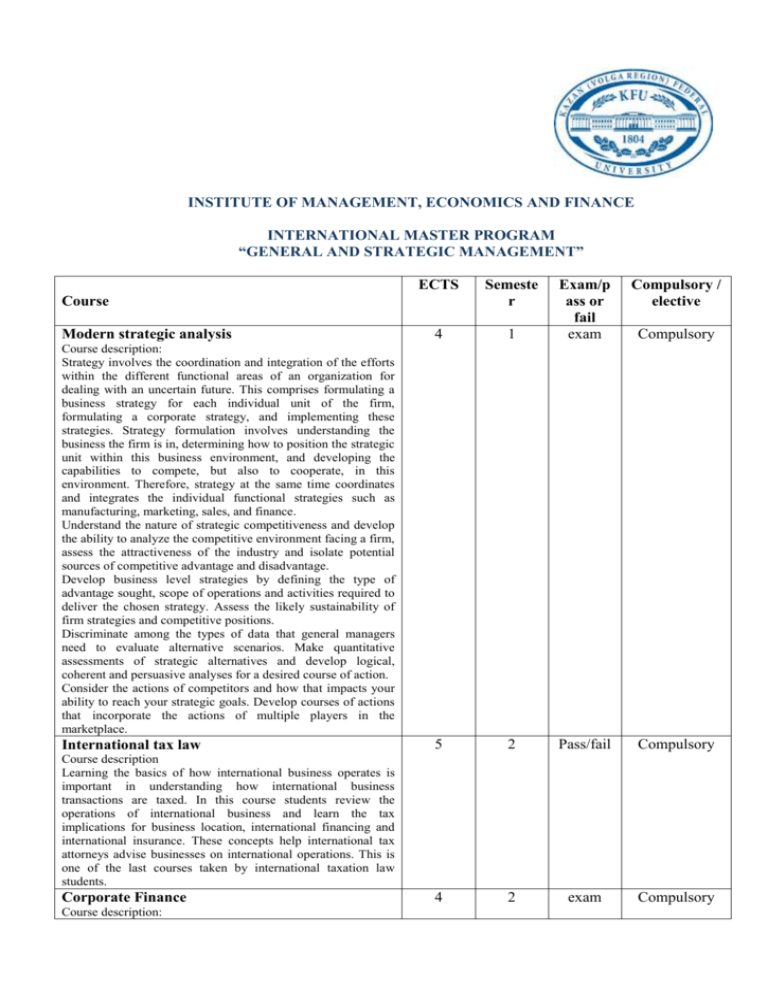
INSTITUTE OF MANAGEMENT, ECONOMICS AND FINANCE INTERNATIONAL MASTER PROGRAM “GENERAL AND STRATEGIC MANAGEMENT” ECTS Semeste r Compulsory / elective 1 Exam/p ass or fail exam 4 5 2 Pass/fail Compulsory 4 2 exam Compulsory Course Modern strategic analysis Compulsory Course description: Strategy involves the coordination and integration of the efforts within the different functional areas of an organization for dealing with an uncertain future. This comprises formulating a business strategy for each individual unit of the firm, formulating a corporate strategy, and implementing these strategies. Strategy formulation involves understanding the business the firm is in, determining how to position the strategic unit within this business environment, and developing the capabilities to compete, but also to cooperate, in this environment. Therefore, strategy at the same time coordinates and integrates the individual functional strategies such as manufacturing, marketing, sales, and finance. Understand the nature of strategic competitiveness and develop the ability to analyze the competitive environment facing a firm, assess the attractiveness of the industry and isolate potential sources of competitive advantage and disadvantage. Develop business level strategies by defining the type of advantage sought, scope of operations and activities required to deliver the chosen strategy. Assess the likely sustainability of firm strategies and competitive positions. Discriminate among the types of data that general managers need to evaluate alternative scenarios. Make quantitative assessments of strategic alternatives and develop logical, coherent and persuasive analyses for a desired course of action. Consider the actions of competitors and how that impacts your ability to reach your strategic goals. Develop courses of actions that incorporate the actions of multiple players in the marketplace. International tax law Course description Learning the basics of how international business operates is important in understanding how international business transactions are taxed. In this course students review the operations of international business and learn the tax implications for business location, international financing and international insurance. These concepts help international tax attorneys advise businesses on international operations. This is one of the last courses taken by international taxation law students. Corporate Finance Course description: This course concentrates on issues and analytical problems relating to corporate cash flow modeling, valuation, mergers and acquisitions, and capital raising. It uses case studies, textbook, journal articles and current events to illustrate key decisions made by managers, investment bankers, investors and regulators. The course also seeks to develop students’ ability to make, articulate and defend their judgments in a realistic setting both orally and in writing. International trade 2 3 Pass/fail Compulsory 3 1 Pass/fail Compulsory Course description This course is of a practical nature and focuses on the detailed requirements of international trade with respect to exporting, importing, the analysis of foreign markets and the management of risk. International trade policy is also studied in some detail. Aims and objectives of the course are: to introduce and familiarize students to the main theories of international trade. to build students’ awareness of the role that trade plays in economic development. to build an awareness of the complexities and techniques in conducting international trade. to develop critical judgement of the main issues involved in conducting trade through the application of theory to practice. At the end of this course successful students are expected to be able to understand the detailed requirements involved in managing foreign trade, procedures involved within different modes of transport, understand foreign exchange procedures and the management of risk, explore and analyse strategic and tactical elements involved in foreign trade. Research Methods in Management Course description: This course covers principles of research design and data collection with examples drawn across the areas of marketing management, industrial relations, policy analysis, etc. Both cases and computer-based exercises are used. While effective directors and business managers recognize the value of using research to help develop their strategies and better understand the market and their customers, they do not always understand when and how to employ solid, effective research approaches. This course will cover the fundamentals of research design, research instrument design, fielding research projects, sample design, data input and analysis, uses of secondary research, the theory behind research methodology, and when and how to identify when it is important to conduct research. Upon course completion, students should be able to: Understand what research is and why it is important to organizations Identify the main research methods Distinguish between qualitative and quantitative, primary and secondary research Be able to define rigour and strong inference (threats to validity and reliability) Detect when research is done well and draw conclusions from it Design high quality research Understand how to conduct formal versus scientific research Describe and utilize levels of measurement Construct research instruments, such as surveys Develop good survey, interview and focus group questions Understand and recommend solid sampling methods Design methods to increase response rates for various methodologies Consider the ethics and politics of conducting research Conduct basic data analysis and report on the results (using SPSS) Communicate and understand research results Conduct a primary research project from start to finish Academic Writing (foreign language) 2 1 Pass/fail Compulsory 2 3 Pass/fail Compulsory 4 1 exam Compulsory 2 3 Pass/fail Compulsory 6 1 exam Compulsory Course description During the course students will learn how to find relevant sources of information, make a plan of the research, produce an outline of the research. They will master the skills of paraphrasing, summarizing, citing and referencing, organizing paragraphs, making headlines. After mastering the course students should be able: To distinguish the structure of the research article a To know the typical features of the research article parts To be aware of the academic vocabulary, grammar and style To know the specific feature of critics, synthesis, essays. Corporate Strategy: Design and Implementation Course description: This course focuses on corporate and divisional policy formulation and implementation. The knowledge and techniques learned in earlier courses will be applied in an integrated fashion to the process of strategic decision making and organizational change. Among the topics considered in the course will be the relationships of organizations to their environments, the hierarchy of organizational objectives, structured as well as informal approaches to strategic planning, the integration of business functions, organizational structure, and policy implementation and evaluation. A significant aspect of the course is devoted to assessing the competitive dynamics of firms. Current management problems Course description: This course is an introduction to the principles of management examining their application in public and private, profit and non-profit organizations. Students will explore the areas of employee motivation, group behavior, leadership, strategic planning, organizational design, and career opportunities. Fundamental concepts of management, effective communication competency, ethical dilemmas faced by managers and corporate social responsibility will be discussed. Management Strategies Course description: Students will be able to understand main problems and directions of organization development diagnose organizations design organization development' programs understand factors of making and realization organization development' programs use change management models overcoming resistance to change Corporate Development and Change Management Course description: The management of change and organizational development is a dynamic process. This course focuses on understanding how to plan and implement change in various organizations and other settings. Effective change management maximize the congruence between an organization's mission, goals, strategies, environment, technology, structure, processes, people, culture and reward systems. Managing successful change requires an understanding of the systemic interrelationships among these factors and how changes in one affect another. Within the context of this organizational complexity, students will examine the role of change agents at various levels of the organization and the integrative competencies and interpersonal skills required of individuals who initiate, manage and are affected by change. Managing change is also a sense making and creative process; it requires the ability to discern new patterns and relationships both inside and outside the organization as well as openness to new ideas and possibilities. International Economic Law 2 3 Pass/fail Compulsory 3 4 exam Compulsory Course description: scientific discussion on the notion of international economic law and the scope of the course object sources of international economic law the main principles of international law applied to economic relations special principles of international economic and trade law framework for international economic cooperation: universal conventions and intergovernmental organizations; regional agreements and institutions role of UNO in the development of international economic cooperation international economic integration: free trade zones, custom unions, common markets global trading system: WTO (legal foundation, structure, membership, WTO law, instruments of regulation, dispute settlement) trade globalization from the perspective of the developing world economic aspect of intellectual property rights and protection of these rights in international law international investment: international and national regulation international system of finance Management of regional development Course description The course involves the study of the basic concepts, principles and features, organization and functioning of regional economy and issues of Regional Management in the Russian Federation and the Republic of Tatarstan.The purpose of the course is to build students' knowledge and skills about informed decisionmaking in the field of efficient socio-economic development and use of the potential of the region.To achieve this goal during the course students are given an extensive theoretical basis of regional economy and regional development management, as well as examples of specific practical problems in the field.The course introduces students to the ongoing changes in the regional economy and management capabilities use of foreign experience and new forms of regional governance systems. Strategic Marketing 4 2 exam Compulsory 2 3 Pass/fail Compulsory 6 2 exam Compulsory Course description: This course will review and appraise contemporary marketing strategy, literature and practice to provide students with a comprehensive understanding of marketing and business strategy, and fundamentals in the rapidly changing digital market space. By the end of the course students will be able to: Think in the terms of a professional marketer Read and evaluate specialist marketing literature / cases Develop integrated marketing strategies for global brands Be able to critically appraise the marketing strategy of a global brand leader Apply strategic marketing concepts to the global digital economy Innovation management Course description: Innovations management course is designed in order to provide complex vision of innovations development, promotion and business model creation. The course includes research and development aspects, marketing aspects, human resources, business model creation, measuring and other related issues, and is aiming to create systematic thinking in terms of innovations management. Course aim is to create systematic evaluation of tools and instruments in innovations management. This aim is achieved by the following goals: 1. understanding the process of innovational product development 2. choosing appropriate marketing tools in innovations management process 3. assessing of innovation based business models 4. valuation of human resources in innovational management 5. assessing financial opportunities in innovations management 6. understanding of open innovation business models International business and finance Course description This course presents an overview of the international finance environment and a detailed analysis of tools and techniques for international financial management. Key topics include the functioning of foreign exchange markets and international capital and money markets, international portfolio diversification, multinational capital budgeting, import-export financing, direct foreign investment, and international banking. his course deals with the theory of international trade, commercial policy, balance of payments, and international monetary issues. Key topics include the theory of comparative advantage, exchange rate determination, different forms of protectionism, open-economy fiscal and monetary policies, and the analysis of common markets and free-trade areas. Social transformations and Social Problems 3 3 exam Elective 3 3 exam Elective 3 4 Pass/fail Elective Course description: the traditional and constructionist approach to social problems the sociological concepts of social change and social transformation social problems in socialist and post-socialist societies social transformation and changing conditions for social problems construction the public arenas model: the idea of competition between social problems for the entry to public arenas media, statistical and sociological constructions of social problem of crime in Russia reference societies and the social problem of high prison population rate (USA, Russia and European countries) media, statistical and sociological constructions of social problem of HIV/AIDS in Russia media, statistical and sociological constructions of social problem of corruption in Russia Management of company social development Course description The goal of the course is the formation of complex knowledge and skills of specialists in human resources management needed to develop best management practices of social activities of the organization, which opens up the possibility of self-realization in the labor force and stimulate the economic efficiency of the organization. The objective is to study the basic concepts of staff social development management; formation of skills of application of the theory of personnel social development management to develop programs of social development, taking into account the specific features of social organization, the formation of skills development and implementation of social development programs for staff. Development and implementation of innovative projects Course description During this course, students will learn: How to conduct a new product diagnostic audit and develop a new product strategy. Best practices in new product development that separate the ''best" firms from the "rest" in different industries. How to develop a new product development process that incorporates the best practices and is based on cutting-edge frameworks and approaches. How to adapt the new product development process for: different types of projects - lower risk short-term versus breakthrough projects, in-house versus outsourced projects, platform projects, different strategic decision situations: speed to market versus extensive development, proactive versus reactive strategies, building flexibility into the process. How to implement the new product development process. How to create new market space by identifying a new value curve that better meets customer needs. How to identify new product opportunities using both "resource based" and "market based" approaches. How to uncover "breakthrough" consumer needs and develop and test new product concepts that serve those needs. How to create a value proposition for your new product and develop a positioning strategy. How to use latest tools and techniques that will help you to design new product offerings that deliver customer value through differentiating benefits. How to develop sales forecasts for your new products and services. How to develop a launch plan. How to build successful cross-functional teams for effective new product development. Cutting-edge techniques and latest frameworks for effective new product development. State regulation of small and medium-sized businesses in a transition economy 3 4 Pass/fail Elective 2 3 Pass/fail Elective Course description Students will be able to understand basic concepts of small and medium entrepreneurship (SME), particularly paying more attention to the role of it's development in the transition economy; be able to analyze and systematize the role of the government in SME's development in modern societies from an economic perspective; be able to understand the problems and pecularities of small and medium entreprises in the transition economy; be able to apply economic analysis to the role of the state from a positive perspective (describing the government, developing theories that predict how the economy will change or what the effects of different policies are) and from a normative point of view (evaluating alternative policies, weighing up the various benefits and costs in terms of efficiency and equity); understand the peculiarities of organization and functioning of SME's governmental support on national and regional levels in industrialized and transition countries; be able to make own decisions on the problems of the development of SME's governmental support in the transition economy. Information Resources and Technologies in Management Course description Upon completion of the course, students will: Be proficient managers of IT, that is, be able to apply the capabilities of IT to solve business problems using best- practice approaches to IT management. Be savvy investors in / consumers of IT; be able to perform an analysis of the costs, benefits, and risks associated with IT applications in a particular context. Be strategic, forward-looking decision-makers; understand how the technical and economic capabilities IT are reshaping both the internal operations of firms as well as their relationships with customers, suppliers, and business partners and will continue to do so. Ethic Management and Social Responsibility of Business 2 3 Pass/fail Elective 3 3 exam Elective 3 3 exam Elective Course description Social responsibility of business is a course designed in order to ensure ethical thinking of managers based on the model of sustainability. The course includes the issues of ownership and stewardship theory, social responsibility assessment, sustainability models, community and government relations aspects, social business issues, and is aiming to create systematic thinking in terms of corporate social responsibility. Course aim is to create systematic approach towards social responsibility of business performance. This aim is achieved by the following goals: understanding the background of social responsibility in terms of theory making decisions taking into account ethical issue choosing appropriate technology taking into consideration social responsibility issues valuation of governmental and community relations in social responsibility understanding the global issues of social responsibility evaluating and forecasting social business development Quality Management and International Standards Course description The course aims to engage the student on contemporary issues pertaining to the management of quality in services and manufacturing, in international and domestic markets, as well as in the private and public sectors. Further, the conceptual and analytical skills developed in this course should enable the student to provide leadership in managing for quality. Much of what the student learns will be practitioner-oriented and directly applicable to the so-called “real world”. Informative readings on quality management topics from reputable journals, and experiential learning exercises and projects complement the text and shape learning in this class. The student is expected to engage the professor and his or her fellow students in the discussion of pertinent issues. Consumer Behavior. Advanced level Course description The duality and contradiction of the Russian culture and mentality have natural and historical conditions, as well as religious roots. For most Russians, transitioning into new democracy with its associated freedoms and market economy has not been an easy task, and for many particularly members of the older generations, the change was not a welcome one both in business and personal life. The failure of communism brought with it freedom that many were not prepared to exercise. Not all have welcomed the substantial restructuring of the social order that followed the implosion of the USSR - for mainly apolitical reasons (worsening of conditions for pensioners, state health care patients, educational institutions, cultural organizations, etc). This course introduces the student to the influence that Russian mentality has on marketing activities and consumer behavior. Students will apply theoretical concepts to marketing strategies and decision-making. Topics include consumer and marketing segments, environmental influences, individual determinants, decision processes, information research and evaluation Management of Competitiveness 2 3 Pass/fail Elective 2 3 Pass/fail Elective 2 3 Pass/fail Elective Course description Organisations face increasing environmental uncertainty with shortening product and technology life cycles and increasing competition. Managers need to develop an understanding of their organisation’s industry structure, external environment as well as its internal strengths and weaknesses. It is also important that managers are able to think creatively in formulating and implementing their strategies to ensure their organisation’s success in its industry. This course, therefore, focuses on providing future managers with relevant strategic management concepts to advance their skills and abilities so that they can contribute towards an organisation’s competitive advantage. Environmental, Social and Economic Measures for Sustainable Development of Transition Economies Course description Sustainable development: definition, application, role for transition countries. World population growth and its influence on the earth environmental quality. Natural recourse consumption and management. Energetic crisis and its influence on sustainable development of ecosystems. Global ecological problems. International relationships to guarantee of environmental security. Ecological policy in transition countries. Some approaches for ranging the soil on the base of its contamination with pollutants. Methods of establishment of Upper Permissible Level of toxicants in soil. Remediation of soil contaminated with organic and nonorganic pollutants. Regulations governing agricultural use of biosolids. Regulations governing management of wastes. Political Management Course description: Political management is a course designed in order to provide an insight of government regulation and government relations in transitions economies. The course includes theoretical issues, informal economy assessment and influence, and is aiming to create systematic understanding of politics in the environment of transition economy development. Course aim is to create understanding of the role of policies and government regulations in business regulation in transition economies. This aim is achieved by the following goals: understanding the structure of government regulation assessing government regulation tools and regulation techniques assessing institutional environment in transition economies understanding the nature of informal economy relations and valuation of informal economy evaluating government relations in transitions economy evaluating business models in regulated economies Theory and Practice of Management Consulting Course objectives Understand the consulting industry in Russia and globally. Recognize the role of management consultants. Become familiar with an industry best-practice, five-stage consulting approach that ensures consulting projects and activities are organized and methodical. Integrate functional areas of Human Resources, Strategic Planning, Finance, Operations, Information Technology, Marketing, and others. Acquire consulting tools and techniques. Gain a perspective of how both internal and external consultants interact with organizations. Gain critical team work and client communication skills. Build a strong understanding of change and change management theory and practice. Know how to help clients assess their current situation, develop strategies for addressing challenges and opportunities, and address change management processes in the implementation of recommendations. 2 3 Pass/fail Elective
